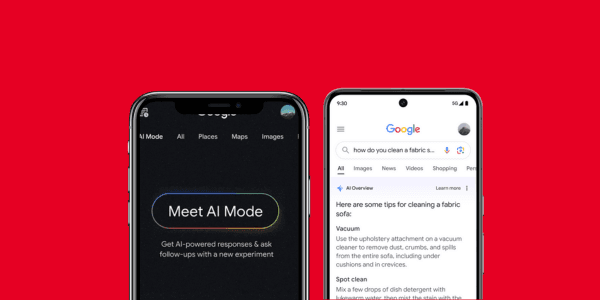Your content is being found, but it hardly generates any traffic. Meanwhile, you notice that Google increasingly provides the answer itself, without mentioning your site. This is due to AI Overviews and AI Mode – two powerful features within Google Search that generate information instead of simply redirecting. Those who continue to optimize as they did before will remain invisible in this new search environment.
How Google AI Mode Works and What It Means for Your Content
Unlike traditional searches, AI Mode does not treat a query as an endpoint, but rather as the beginning of a complex reasoning process. User data such as previous searches, location, or device are combined with the original search query. Google then generates a series of synthetic queries that refine the underlying search intent. Only content that is relevant and well-structured on multiple levels ultimately qualifies to be part of the generated answer.
Why traditional SEO is no longer sufficient
Classic SEO methods such as optimizing titles, metadata, and link structures are still valuable, but they are no longer decisive. In AI Mode, your content is compared passage by passage with competitors through what is known as pairwise reasoning. The best, most understandable, and semantically appropriate text is selected. Even then, visibility does not guarantee traffic, as the answer is often so complete that clicking is no longer necessary.
Here's how Google AI Overviews works and how it differs from AI Mode.
AI Overviews largely operate on the same technology, but are embedded in the traditional search results overview. Here too, synthetic queries are generated, but the process is somewhat less extensive than in AI Mode. Nevertheless, the same principle applies: those who do not have content that is clear, reusable, and factually accurate will not be included in the final summary. Important SEO factors include semantic coverage of related topics and content consistency.
What AI Mode and AI Overviews Mean for Businesses and Marketing Teams
For companies, this means that content production is not an endpoint, but an iterative process. Visibility is not a matter of keyword density, but of conceptual coverage and content structure. Monitoring rankings is becoming less reliable. Citations in AI responses will become the new benchmark for success – even if no click follows. This makes SEO increasingly comparable to branding and reputation management.
Practical tips to remain visible in AI-generated search results
The solution does not lie in further optimizing a single keyword. It is about relevance across multiple search intents. Create content that is logical, verifiable, and concise. Think in scenarios, definitions, and comparisons. Ensure that your text is usable at the passage level and fits within different user contexts. AI does not read entire pages – it reuses fragments. Those who do not take this into account will simply be overlooked.
Why AI-based search results raise more questions than traditional SEO
SEO has traditionally focused on discoverability. What is now needed is 'relevance engineering': creating content that is not only found but also helps an AI generate good answers. It's no longer just about ranking, but about being included in a synthesis. Visibility is therefore a combination of context, content, and added value within the user's broader information model.
Anyone who continues to see this as "just SEO" is missing the point. Conversational search demands new strategies, new KPIs, and above all: new conviction from decision-makers to invest in it. This is not a revolution. It is the logical next step, but one that you need to take today.

